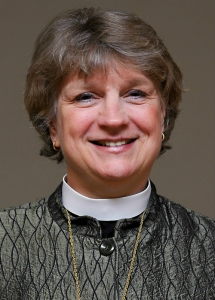 By Bishop Ann Svennungsen
By Bishop Ann Svennungsen
When bishops ordain pastors or consecrate deacons, we ask if they will commit to being an “example in faithful service and holy living.” If their answer is yes, they respond: “I will, and I ask God to help me.”
To what, exactly, are they committing themselves? What, exactly, is holy living? Since it was formed, the ELCA has sought to provide further detail in its expectations about “holy living.” Our predecessor bodies – the ALC, LCA, and AELC – did the same.
Still, this is not a “once-for-all” endeavor. Our guidelines are not set in stone. Pastors and deacons can now divorce. LGBTQ pastors and deacons can now marry. While it was once permissible (and is still legal in some states) for men to rape their wives, that is not acceptable in the church’s understanding of “holy living.”
All that we do and all that we are, both at home and in the public square, is a witness. The shape of our faithfulness bears witness to a loving and just God, who has freed us to love and serve our neighbor.
The ELCA’s constitution gives the ELCA Church Council authority to approve the specific expectations included in our understanding of “holy living.” Currently, the expectations are articulated in “Vision and Expectations.”
AT ITS MEETING ON April 4-7, the ELCA Church Council will review the draft of a document, “Trustworthy Servants of the People of God,” which, if approved, would replace “Vision and Expectations.” The upcoming council discussion has provoked serious and lively debate. Questions include:
- Should rostered leaders be held to higher standards than other Christians? What about the priesthood of all believers?
- Why do we focus so much on sexual misconduct and not as much on failure in prayer, generosity and tithing, and a commitment to justice and the environment?
- Should the potential effect a behavior has on a congregation be considered when discussing expectations? (E.g., an affair with a parishioner affects a congregation in ways that a failure to tithe might not.)
- What policy most effectively prevents boundary violations?
- What is the process for developing such statements as “Trustworthy Servants of the People of God?” Could we advocate for a longer conversation with more inclusive representation?
Neither “Vision and Expectations” nor “Trustworthy Servants” are documents with authority to create new policy. Rather, their authority is to interpret the policy that is created in the ELCA’s governing documents and social statements. To be sure, “interpreting” policy requires making judgments and one could argue our church needs a longer, more inclusive process before making such judgments. However, if our church wishes to create a new ethic about sexuality or prayer or justice expectations, it will require a more involved process, including Churchwide Assembly vote(s).
JUDGMENT CALLS ARE also made in the application of documents like “Vision and Expectations.” Recently, the Conference of Bishops apologized for its failures in this regard:
As a Conference of Bishops, we recognize and acknowledge that [Vision and Expectations]’ application has been uneven and inequitable. We express our profound grief and deep regret for the times when Vision and Expectations has been misused to single out, marginalize, and block people seeking to be leaders in this church when their peers were not always held to the same vision and expectations.
If our church wishes to create a new ethic about sexuality or prayer or justice expectations, it will require a more involved process, including Churchwide Assembly vote(s).
The discussion of “holy living” is complicated, profound, and evokes strongly held opinions. All that we do and all that we are, both at home and in the public square, is a witness. The shape of our faithfulness bears witness to a loving and just God, who has freed us to love and serve our neighbor. People are paying attention. How, then, shall we live?
Please join with me in praying for our Church Council as they meet April 4-7. We are a theologically grounded, gospel-centered, deeply engaged, and interconnected church. May the Spirit work through all the charisms of the ELCA and our mutual discernment as we each seek to live counter-cultural lives as followers of Jesus.
